
Increasing the impact of Wetland Solutions
-
Integrated delta management
Rotterdam, the Netherlands – To commemorate 60 years of Wetlands International and its predecessors on Monday 22 September Wetlands International co-hosted a global stakeholder forum at the World Trade Center Rotterdam, together with the Ministry of Economic Affairs and Ministry of Infrastructure and Environment of the Netherlands. This was followed by an awards reception and a meeting of the Member Delegates and Board of Association.
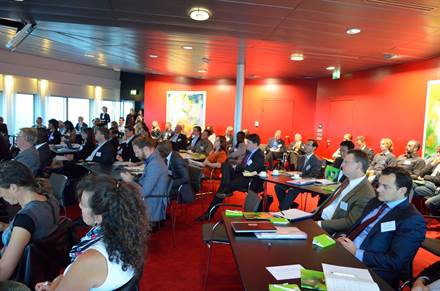
The international ‘Wetland Solutions for water, people and nature’ event brought together a wide range of our prominent stakeholders from business, NGOs, foundations, governments and knowledge institutes to discuss the interlinked environment and development challenges of water, food, climate and trade. It featured an engaging group of keynote speakers who energised the attendees by vividly illustrating some of the key challenges facing water in the coming decades and the role of wetlands as solutions.
“Investment in wetlands is not a luxury, it is a necessity. Furthermore it is very rewarding in terms of livelihoods.” said Tineke Huizinga, Chair of the Delta Alliance in her opening remarks.
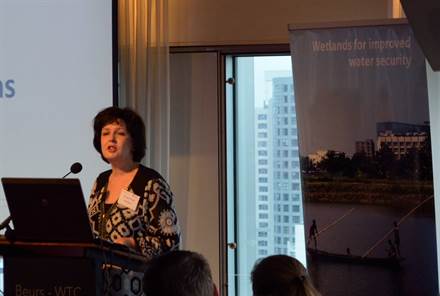
In her former Minister role, Ms Huizinga shaped the Dutch water safety measures and governance and instigated the “Room for the River” programme. She reflected that the relationship between economic development and ecosystems was no longer “in balance” and that public-private partnerships for investment in wetlands were a key way to turn this around.
“We will get thirsty before we get hot.” Kitty van der Heijden

Kitty van der Heijden of World Resources Institute, Europe highlighted the growing number of people living under water stress coupled with the loss of wetlands. With the protection and restoration of wetlands recognised as United Nations 2020 Sustainable Development Goal, she stressed that it is urgent that we shift the wetlands narrative. Politicians need to understand better the link between freshwater ecosystems and livelihoods. Rather than continuing to destroy wetlands, for example in the planned massive investments in water infrastructure, we should give focus to the business case to invest in maintaining and restoring wetlands as natural infrastructure, providing a range of co-benefits for water, climate and local economy.
“Damaged ecosystems are the hidden hand behind many disasters.” Fred Pearce
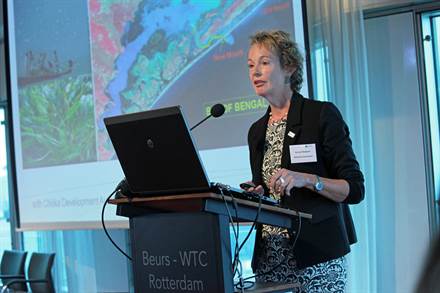
Wetlands have the greatest value of services for human well-being, yet they have suffered the greatest habitat losses over the past century. Wetlands International CEO Jane Madgwick pointed to the recent floods in India[1] and the Balkans as a case in point, saying “to a large extent the impacts of these floods were predictable and preventable. Investing in wetlands as water stores in the landscape helps save human lives and livelihoods and makes economic sense.”
“Nature adapts, changes and responds to changes in a way concrete cannot.” Fred Pearce
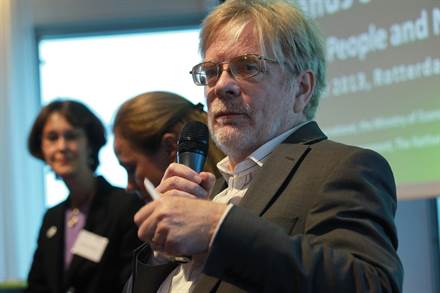
Fred Pearce reported on his journeys in India, Mali and Senegal where he profiled vulnerable communities in the publication Downstream Voices that was commissioned by Wetlands International. He found a growing awareness that wetland degradation and a changing climate are creating increased disaster risks. He was encouraged by examples of very poor, remote village communities being enabled to improve the condition of their wetlands, their livelihoods and resilience to extreme weather events. He emphasised that most wetlands in the world are “human constructs”, shaped by human use and that we should recognise that local communities often have the knowledge and expertise needed to better manage their natural resources. And that it is their right to continue to have access to and manage these water and wetland resources. He said that organisations like Wetlands International play an important role in enabling communities to take action and in advocating landscape-scale solutions and governance mechanisms that safeguard these local rights.
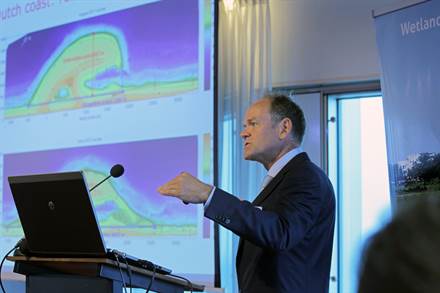
Pieter den Besten, the leader of the Building with Nature programme within the Ministry of Infrastructure and Environment in the Netherlands, discussed how Dutch thinking on flood protection had evolved historically from ‘fighting nature’ to the current emphasis on natural solutions and the programme of work being done by Building with Nature. He pointed to the potential for these kinds of approaches to be adapted and applied worldwide.
Wetlands as Solutions – An agenda for action
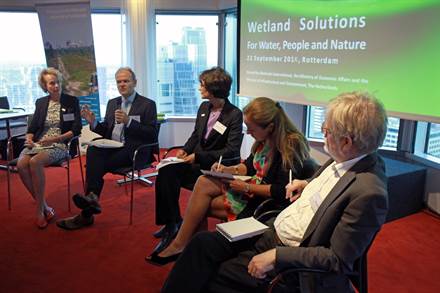
Wetlands are a solution for several key challenges around the world related to water, food and climate. The stakeholder discussion concluded that several key actions are needed to catalyse an agenda that supports wetlands as solutions:
- There are huge risks to the three E’s – Economy, Environment, Equity – if we don’t take action on water. At the same time, it is not possible to have a water agenda without wetlands – they cover the three E’s.
- The UN Sustainable Development Goals offer a universal agenda that recognises for the first time the need for restoration and management of water-related ecosystems, including wetlands, as a basis for addressing water scarcity and water risks.
- Water risks cannot be addressed by a single sector; there needs to be a holistic cross-sectoral approach.
- Up-scaling of promising nature-based solutions can best be tackled by a combination of civil society (NGOs) acting in partnership with government and business. Leadership and bold thinking is needed from the private sector, civil society and government to take the initiative in the way the City of Rotterdam has, as a Delta City facing climate adaptation challenges.
- Business is increasingly seeing itself as part of the solution by developing the business case to invest in natural infrastructure like wetlands and by embracing sustainability within supply chains.
- There is a need for more consumer responsibility, particularly in the EU, where consumer behaviour is driving water transfers and deforestation.
- There is dissatisfaction with the way national governments in general are handling natural resources as there is a lack of policy coherence between different ministries. New policy frameworks that include greater policy coherence are needed within governments.
- Innovative financial mechanisms are needed for greater investment in natural infrastructure, together with policy requirements and incentives. Insurance companies should be a natural partner in this respect.
[1] The recent devastation in Kashmir, India is driven by wetland conversion and degradation in Kashmir valley. The largest freshwater lake, Wular Lake formerly functioned as a large sponge that buffered against flooding and low river flows. Now, the lake is silted up and the marshes have been drained and converted for as agriculture and willow plantations. 90% of the absorptive capacity of the lake has gone and flash floods result. The management plan for restoring the lake, prepared for the Indian government by Wetlands International has only been partly implemented. It offers a cost effective solution to reduce flood risk.
